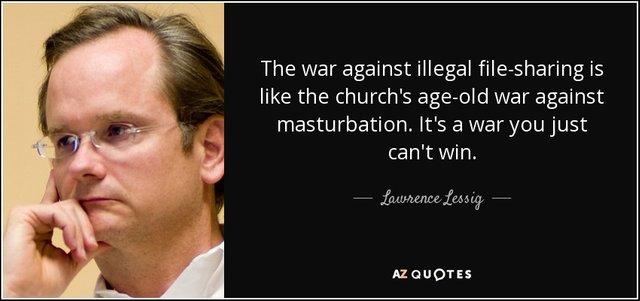Laws That Choke Creativity: Revisiting Lawrence Lessig’s 2007 Ted Talk

Ten years ago this month, law professor and political activist Lawrence Lessig gave a seminal Ted talk, entitled “Laws that choke creativity”. A few years earlier, he had co-founded Creative Commons to provide alternative licensing for user-generated content. Lessig used his talk to explain the bigger picture of why private solutions were needed in copyright law.
The video of this Ted talk is well worth watching. As you will see, some of his examples are dated, but it holds up incredibly well 10 years later. In fact, even with the changes in technology and culture over the last decade, one could argue that the overall message is more relevant than ever before.
In short, Lessig explained that copyright law in the U.S. is broken. As the laws have been written, they forbid much of the creative re-mixing work that young people produce in terms of music and videos, not to mention file-sharing. This has forced a situation where copyright holders become entrenched in an extreme position to protect their rights, while many young people (some of the primary content consumers) develop an opposition to these laws and a willingness to ignore them.
Congress won’t fix the problems because it is corrupt. Its agenda is set by those with power and money. And the courts are too passive to address the problems. Even as a self-proclaimed liberal, Lessig concluded that government solutions were the wrong approach.
Lessig argued in this talk that a market solution could help fuel revolt and reform. He presented the story of how music copyrights had been monopolized in the 1930s by an organization that was able to continually raise the prices for music. He explained how BMI came along to present a licensing alternative for music that caught on and ended up changing the industry (for a while, anyway). And he suggested that a market solution today could harness user-generated content to help force common sense changes.

Creative Commons has done just that for much amateur content. Today, there are over 1 billion works that use one of the Creative Commons licenses. During this period where user-generated content has become so prevalent, Creative Commons and other alternative licensing arrangements have enabled a lot of content sharing that might not otherwise have been legal.
And yet, even if this could be described as a revolt, it has not been a complete solution. It is used primarily for amateur content. The same issues remain with the laws, with government’s agenda being set by large interests, and with the growing extremist views from every side, even in the face of technology that continues to make more things possible. Young peoples’ revulsion to the laws has only continued to worsen.
Ten years later, it seems that we are still in search of solutions.

We must free the content!
I can see a cartoon made from that statement, lol!
Good article, I liked the example of trespass law in the video showing that laws need to change to keep up with modern technology.
Yes, those historical examples were very good illustrations.
nice post @donkeypong i like
If it encourages people to "break laws" that's a good thing!
After 20 years of "pirating" stuff myself I really think we are winning this one on one level- it's certainly never been easier.
But the next question is are we being deliberately fed a lot of what we think we are pirating? (like movies that are actually propaganda)
With such laws people are committing felonies all the time and dont even know it, I think generally this as gone too far I know people want to protect their work but its too much its needs to be eased up a little.
Yes, it's become very unreasonable and could benefit from being "eased up" at least a little.
I choke things all the time... but never creativity.
all laws and regulations choke creativity.
From the moment I came to know about these copyright laws, I have felt that they were just absurd. I get that creative people would like to protect their work but I think the current laws go to far.
As a writer myself, I sometimes find it difficult to find photographs for my articles because they are "owned" by someone else. We need to change some of these laws or at least tone them down at little.
Interesting information! Thank you for sharing!
I agree, and it is good point of view about this. Nice !:)
Glad you enjoyed it.